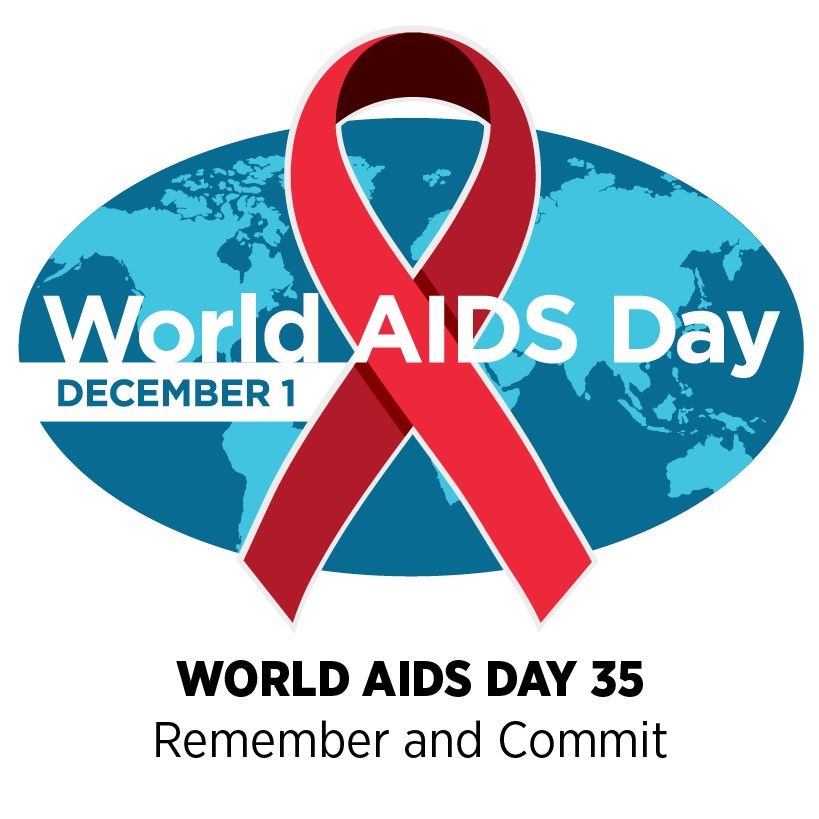World AIDS Day

On Friday, December 1, 2023, the global community commemorates World AIDS Day. commemorates the 35th anniversary of World AIDS Day and is an opportunity to reflect on the progress that has been made while recognizing the remaining challenges. With this year’s theme, we also remember those we have lost to AIDS-related illnesses and to emphasize the urgency of our collective commitment to end the HIV epidemic.
The U.S. Government's theme for World AIDS Day 2023 – World AIDS Day 35: Remember and Commit – commemorates the 35th anniversary of World AIDS Day and is an opportunity to reflect on the progress that has been made while recognizing the remaining challenges. With this year’s theme, we also remember those we have lost to AIDS-related illnesses and to emphasize the urgency of our collective commitment to end the HIV epidemic.
In recognition of World AIDS Day, the IHS National HIV/HCV/STI program is sharing news and resources about its commitment to end the HIV epidemic in Indian Country.
Indigenous HIV/STI/HCV Strategy 2022-2025
The Indigenous HIV/HCV/STI Strategy (Indigi-HAS) guides Indigenous communities to address the co-occurring epidemics of HIV, HCV, and STIs (known as the syndemic) through culturally respectful approaches. We think of this creation as an Indigenous pathway – complementary to the national strategies – allowing Indigenous stakeholders to formulate their own response to the syndemic in their communities by incorporating local governance and Indigenous knowledge. Developed by an advisory committee in partnership with several stakeholders and with financial support from the Minority HIV/AIDS Fund, Indigi-HAS adopts a syndemic approach, addressing HIV, HCV, and STIs in an integrated way.
Read the full strategy on the Indian Country ECHO site.
IHS Awards address Epidemic in Indian Country
On World AIDS Day, the Indian Health Service is bringing attention to the current HIV, HCV, and STI syndemic (two or more health conditions overlap and worsen a disease or overall health) affecting many parts of Indian Country. In 2022, IHS published a notice of funding opportunity to end the HIV and HCV epidemics in Indian Country, known at IHS as the ETHIC Program. As a result, seven tribal and urban Indian organizations received $1.2 million in funding to work towards reducing new HIV, HCV and STIs infections in Native communities.
Read our IHS blog post to learn more about the ETHIC awards and grantees.
2022 Annual HIV Data from the Centers for Disease Control and Prevention (CDC)
The CDC recently released preliminary annual HIV data for 20211 to help monitor our collective efforts to end the HIV epidemic in the U.S. Organizations can use this data to help inform HIV program planning, implementation, and evaluation.
- Diagnoses – according to CDC, there were 222 new HIV diagnoses among American Indian and Alaska Native people
- Linkage to care – linkage to care – according to CDC, 77.4% of American Indian and Alaska Native people diagnosed with HIV were linked to care
To learn more about our collective national progress towards ending the HIV epidemic in the U.S., visit America’s HIV Epidemic Analysis Dashboard. Due to the impact of the COVID-19 pandemic, data for 2020-2022 should be interpreted with caution.
Core Indicators for Monitoring the Ending the HIV Epidemic Initiative (Preliminary Data): National HIV Surveillance System Data Reported through June 2023; and Preexposure Prophylaxis (PrEP) Data Reported through March 2023 – HIV Surveillance Data Tables, CDC
HIV and STI Self-Testing Services
Native Test: order a free HIV self-testing kit .
I Want The Kit (IWTK): order a free confidential at home STI-self testing kit.
IHS U=U AMBASSADOR PROGRAM
In the effort to eliminate stigma for Native People Living with HIV (PLWH), the knowledge of Undetectable=Untransmittable or U=U has genuinely moved the needle on public awareness and perception of the modern-day HIV movement. With HIV rates disproportionately affecting Indian Country, the Indian Health Service (IHS ) is recruiting Native American PLWHs who would like to share their stories and the message that PLWHs who are taking their HIV medicine and have an undetectable viral load CANNOT sexually transmit HIV.
MISSION STATEMENT
The IHS U=U Ambassador Program seeks to disseminate correct information about HIV and U=U via online campaigns through the visibility of our Ambassadors. We are minimizing stigma, creating safer spaces within Indian Country for PLWH, and minimizing barriers to care.
OBJECTIVES
All Ambassadors will receive basic U=U science, communications, and advocacy training. Working together, Ambassadors and IHS will educate and build the capacity of providers and communities to integrate the U=U message into sexual health communications, advocacy, and clinical practice.
GOALS
Each Ambassador is responsible for 3 U=U-related social media posts a month while simultaneously working with IHS to advise providers on better ways to integrate U=U into clinical practices, create more awareness about U=U, and bring us closer to our global goal of ending the HIV epidemic.
If interested in participating, please contact Rick Haverkate (HIV/HCV/STI Branch Chief, OCPS).


